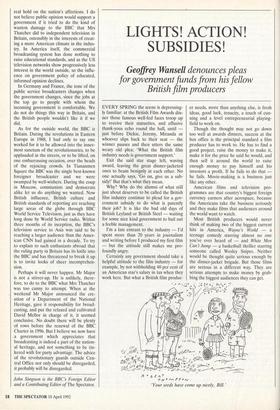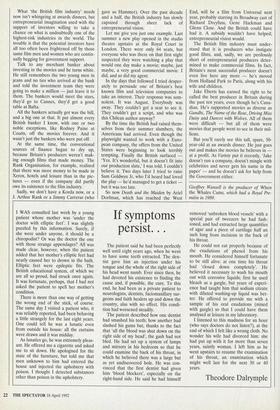LIGHTS! ACTION!
SUBSIDIES!
Geoffrey Wansell denounces pleas
for government funds from his fellow British film producers
EVERY SPRING the scene is depressing- ly familiar: at the British Film Awards din- ner those famous well-fed faces troop up to receive their statuettes, and effusive thank-yous echo round the hall, until just before Dickie, Jeremy, Miranda or whoever slips back to their seat — the winner pauses and then utters the same weary old plea: 'What the British film industry needs is government support.'
Exit the said star stage left, waving award, leaving the great dinner-jacketed ones to beam benignly at each other. No one actually says, 'Go on, give us a sub- sidy!' But that's what they mean.
Why? Why do the alumni of what still just about deserves to be called the British film industry continue to plead for a gov- ernment subsidy to do what is patently their job? It is like the bad old days of British Leyland or British Steel — waiting for some nice kind government to bail out a feeble management.
I'm a late entrant to the industry — I'd spent more than 20 years in journalism and writing before I produced my first film — but the attitude still makes me pro- foundly angry.
Certainly any government should take a helpful attitude to the film industry — for example, by not withholding 40 per cent of an American star's salary in tax when they work here. But what a British film produc- er needs, more than anything else, is fresh ideas, good luck, tenacity, a touch of cun- ning and a level entrepreneurial playing- field to work on.
Though the thought may not go down too well at awards dinners, success at the box office is the principal standard a film producer has to work to. He has to find a good project, raise the money to make it, make it for the price he said he would, and then sell it around the world to raise enough money to pay himself and his investors a profit. If he fails to do that he fails. Movie-making is a business just like any other.
American films and television pro- grammes are that country's biggest foreign currency earners after aerospace, because the Americans take the business seriously and they make films that audiences around the world want to watch.
Most British producers would never think of making two of the biggest current hits in America, Wayne's World — a teenage comedy starring almost no one you've ever heard of — and White Men Can't Jump — a basketball thriller starring someone called Wesley Snipes. Neither would be thought quite serious enough by the dinner-jacket brigade. But those films are serious in a different way. They are serious attempts to make money by grab- bing the biggest audiences they can get.
'Your seeds have come up nicely, Bill.'
What 'the British film industry' needs now isn't whingeing at awards dinners, but entrepreneurial imagination used with the support of investors willing to take a chance on what is undoubtedly one of the highest-risk industries in the world. The trouble is that the potential investors have all too often been frightened off by those same film men and women who are contin- ually begging for government support.
Talk to any merchant banker about investing in the movies and he turns white. He still remembers the two young men in jeans and no ties who arrived at the bank and told the investment team they were going to make a million — just leave it to them. The bankers would meet the stars, they'd go to Cannes, they'd get a good table at Bafta.
All the bankers actually got was the bill, and a big one at that. It put almost every British banker I know, with one or two noble exceptions, like Rodney Paine at Coutts, off the movies forever. And it wasn't just the bankers who were put off.
At the same time, the conventional sources of finance began to dry up, because Britain's producers weren't mak- ing enough films that made money. The Rank Organisation, for example, realised that there was more money to be made in Xerox, hotels and leisure than in the pic- tures — even if the company did partly owe its existence to the film industry.
Sadly, we don't have a Korda now, or a J. Arthur Rank or a Jimmy Carreras (who gave us Hammer). Over the past decade and a half, the British industry has slowly capsized through sheer lack of entrepreneurial vision.
Let me give you just one example. Last summer a new play opened in the studio theatre upstairs at the Royal Court in London. There were only 64 seats, but everyone who was there on that first night suspected they were watching a play that would one day make a movie; maybe, just maybe, a very good commercial movie. I did, and so did my agent.
In the days that followed I tried desper- ately to persuade one of Britain's best known film and television companies to take an interest. Their response was som- nolent. It was August. Everybody was away. They couldn't get a seat to see it. They couldn't get a script, and who was this Chilean author anyway?
By the time the British had raised them- selves from their summer slumbers, the Americans had arrived. Even though the playwright wanted to work with a Euro- pean company, the offers from the United States were beginning to look terribly tempting. Finally the British surfaced 'Yes. It's wonderful, but it doesn't fit into our production slate,' I was told. I couldn't believe it. Two days later I tried to raise Sam Goldwyn Jr, who I'd heard had loved the play — he'd managed to get a ticket but it was too late.
So now Death and the Maiden by Ariel Dorfman, which has reached the West
End, will be a film from Universal next year, probably starring its Broadway cast of Richard Dreyfuss, Gene Hackman and Glenn Close. And the British could have had it. A subsidy wouldn't have helped; entrepreneurial vision would.
The British film industry must under- stand that it is producers who instigate good films, and, sadly, we are perilously short of entrepreneurial producers deter- mined to make commercial films. In fact, Britain's most successful producer doesn't even live here any more — he's moved from Holland Park to Paris, along with his wife and children.
Jake Eberts has earned the right to be called the best producer in Britain during the past ten years, even though he's Cana- dian. He's supported movies as diverse as Gandhi, The Name of the Rose, Driving Miss Daisy and Dances with Wolves. All of them were difficult — but all of them were movies that people went to see in their mil- lions.
But you'll rarely see this tall, spare, 50- year-old at an awards dinner. He just goes out and makes the movies he believes in at a profit. As Variety put it recently, 'Jake doesn't run a company, doesn't mingle with celebrities and never gets his name in the paper' — and he doesn't ask for help from the Government either.
Geoffrey Wansell is the producer of When the Whales Came, which had a Royal Pre- miere in 1989.



















































 Previous page
Previous page